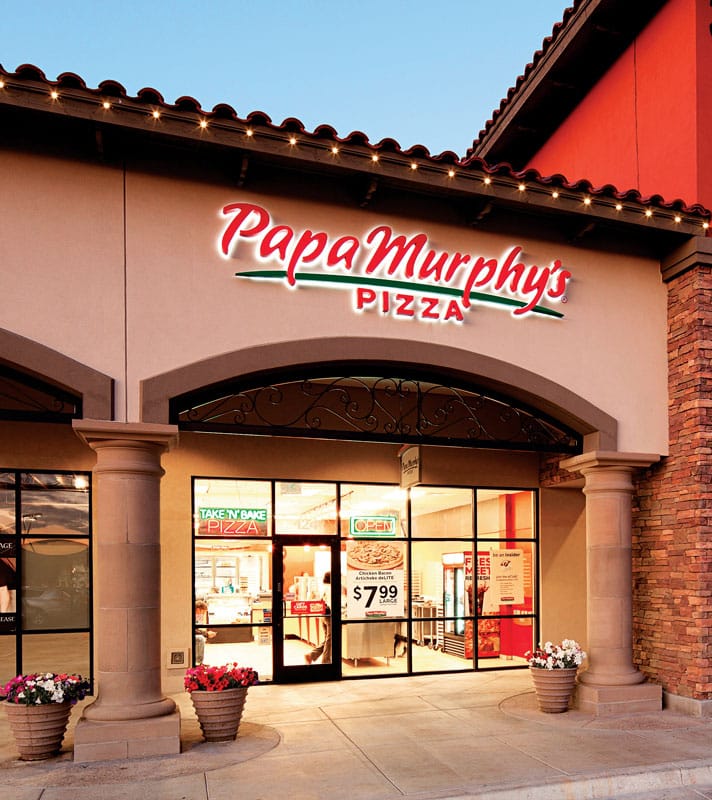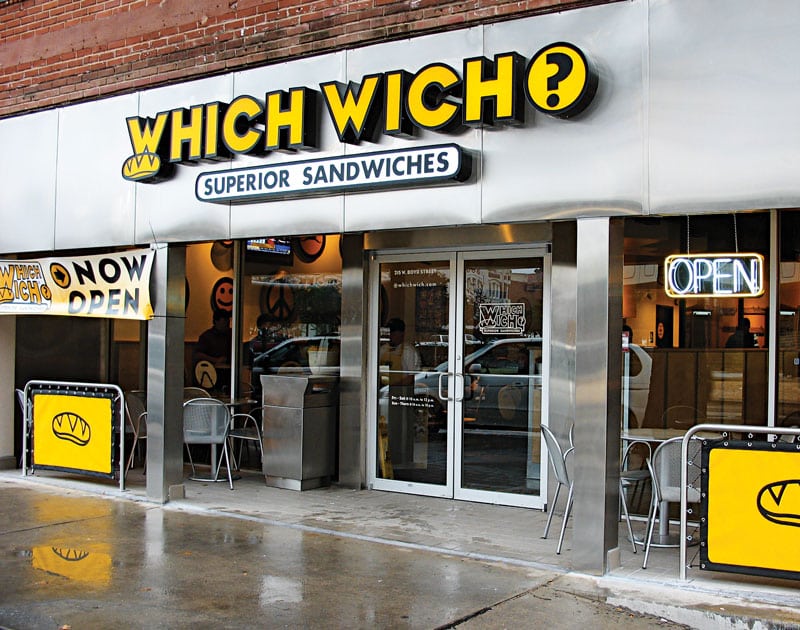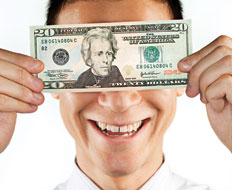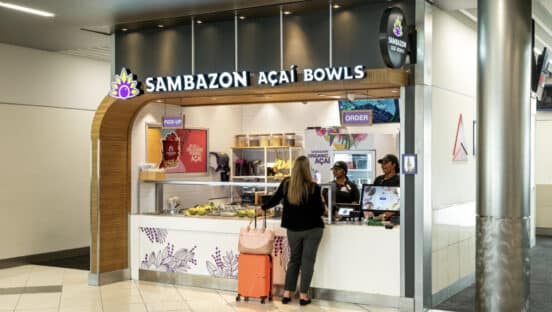For some, it’s an average sales-to-investment ratio nearing 2:1, dedicated corporate support that helps franchisees succeed, or a distinctive niche that carries marketplace allures.
For others, a good franchise deal boasts recent growth despite the nation’s economic woes, stable leadership that ensures consistent strategy, or consumer satisfaction ratings highlighting consumer interest.
Truth be told, however, a good franchise deal is often a mix of all these elements. Much like a tasty recipe claims a pinch of this and a dash of that, some of the nation’s most compelling quick-service franchise deals carry a variety of features that distinguish them and attract entrepreneurial interest. These 10 brands lead the charge.
Wingstop
U.S. Unit Count:
468 (444 franchised)
Franchise Fee:
$25,000
Total Start-Up Costs:
$332,500–$550,000
Royalty:
5% gross sales
Renewal Fee:
None
Marketing Fee:
2% of gross sales
Since its 1994 debut, Wingstop has only elevated its stature, capturing seven consecutive years of same-store sales growth and AUV approaching $750,000.
“We’re a fun, unique concept featuring a product that people crave,” says Dave Vernon, Wingstop’s vice president of franchising.
Roark Capital Group purchased Wingstop in April 2010 and has committed to opening about 50 stores each year. Roark’s weighty presence affords Wingstop the capital to advance the brand via independent research and a comprehensive real estate market model.
“We’re no longer a start-up and our focus is on fully capitalizing on our strengths,” says Vernon, noting that limited-time incentives for new market franchisees include franchise- and royalty-fee reductions.
An Outside View: Wingstop holds appeal for two reasons, Fran-Systems CEO Karen Spencer says. “First, the chicken wing category no longer poses the threat of just being defined as an additional menu item,” she says. “Second, there are no longer questions regarding the future strength of capitalization.”
Papa Murphy’s
U.S. Unit Count:
1,250 (1,233 franchised)
Franchise Fee:
$25,000
Total Start-Up Costs:
$195,000–$380,000
Royalty:
5% of net sales
Renewal Fee:
$7,500
Marketing Fee:
1.5% of net sales
 Papa Murphy’s Take ‘N’ Bake is one of the few pizza chains to report significant growth in the 21st century, doubling both its unit count and sales since 1999 with a concept many feel matches today’s lifestyles.
Papa Murphy’s Take ‘N’ Bake is one of the few pizza chains to report significant growth in the 21st century, doubling both its unit count and sales since 1999 with a concept many feel matches today’s lifestyles.
With no delivery, no commercial ovens, and no sit-down dining, Papa Murphy’s franchisees forgo the hassles and expenses that plague many pizzerias. The simple operations scheme, however, doesn’t dampen its product’s zeal. Zagat’s named Papa Murphy’s the nation’s top pizza chain in 2010.
“The consumer appeal, the ease of operation, the brand strength, and the low entry costs all combine to make Papa Murphy’s an appealing franchise opportunity,” says Steve Figliola, Papa Murphy’s vice president of development.
An Outside View: National Restaurant Consultants president David Kincheloe calls Papa Murphy’s “a great concept to get into with a lower total investment for start up. Plus, the franchise can go almost anywhere due to limited kitchen requirements.”
Stevi B’s Pizza Buffet
U.S. Unit Count:
42 (37 franchised)
Franchise Fee:
$28,500
Total Start-Up Costs:
$500,000–$650,000
Royalty:
5% of weekly net sales
Renewal Fee:
50% of current franchise fee
Marketing Fee:
4.5% of net sales
With an eclectic array of pizza options (including hot-wing and mac-and-cheese options) as well as a buffet operation that captures the lunch crowd and value-conscious diners with its $5.79 average price, Stevi B’s hits on today’s trends. In addition, Stevi B’s outfits its stores with other profit centers, including a game room with redemption center and party room, which attracts families and community groups. As a result, AUV sits near $950,000.
With operations visits from Stevi B’s franchise advisory council every 90 days and ongoing Operations Boot Camps, the Atlanta-based company trains its franchisees to work on the restaurant and not solely in the restaurant.
“Our focus is on helping our operators be orderly and organized so they’re maximizing their investment,” says Melissa McFarlin, Stevi B’s director of franchise sales.
An Outside View: Spencer says that Stevi B’s implementation of support programs and additional services, particularly in operations, “will help them grow with the right partners into a mature brand.”
[pagebreak]
Popeyes Louisiana Kitchen
Popeyes Louisiana Kitchen’s culinary roots in the Cajun and Creole regions of Louisiana distinguish it from its chicken rivals and inspire revenue. Among freestanding Popeyes restaurants that opened in 2009, AUV during the first 52 weeks of operation approached $1.5 million.
U.S. Unit Count:
1,610 (1,573 franchised)
Franchise Fee:
$30,000
Total Start-Up Costs:
$292,300–$422,100
Royalty:
5% of gross sales
Renewal Fee:
$15,000
Marketing Fee:
4% of gross sales
According to vice president of development Greg Vojnovic, Popeyes is not a fee-driven concept, which creates a collaborative franchise relationship. Popeyes headquarters offers support and expertise in menu, operations, marketing, development, and profitability.
“The best way for our company to be successful is to ensure our franchisees’ success and loyalty,” Vojnovic says, adding that multiple lending relationships and incentive programs for both new franchisees and veterans have accelerated Popeyes’ domestic and international growth.
An Outside View: “Popeyes is a very solid and well-established opportunity in a very crowded market,” Kincheloe says. “The company is well established and can offer great support to a franchisee who has little experience and would like to get into the restaurant industry.”
Carl’s Jr.
U.S. Unit Count:
1,097 (674 franchised)
Franchise Fee:
$35,000 for up to 2 units
$30,000 for 3–4 units
$25,000 for 5+ units
Total Start-Up Costs:
$1.2 million–$1.4 million
Royalty:
4% of gross sales
Renewal Fee:
$5,000 for less than 5 years;
$10,000 for 5–10 years
Marketing Fee:
5.5% of gross sales
 A consistent management team has maintained Carl’s Jr.’s focus on brand positioning, sparking same-store sales increases in nine of the last 11 years. Rather than playing in the discounting space with its rivals, Carl’s Jr. achieved value in customer satisfaction and high-quality menu items, such as Black Angus burgers and hand-scooped milkshakes. CKE Restaurants vice president Ned Lyerly calls the Carl’s Jr. strategy “good for margins and our franchisees.”
A consistent management team has maintained Carl’s Jr.’s focus on brand positioning, sparking same-store sales increases in nine of the last 11 years. Rather than playing in the discounting space with its rivals, Carl’s Jr. achieved value in customer satisfaction and high-quality menu items, such as Black Angus burgers and hand-scooped milkshakes. CKE Restaurants vice president Ned Lyerly calls the Carl’s Jr. strategy “good for margins and our franchisees.”
CKE corporate assists franchisees with site selection, restaurant design in flexible sizes, construction, and training. CKE sister brand Hardee’s boasts similar elements in the Midwest and East Coast marketplaces.
An Outside View: “Carl’s Jr. does a great job with rolling out and promoting new products, [though] the franchisee pays for this through slightly higher marketing fees than other similar franchises,” Kincheloe says.
Saladworks
U.S. Unit Count:
93 (93 franchised)
Franchise Fee:
$35,000
Total Start-Up Costs:
$343,802–$494,027
Royalty:
5% of net sales
Renewal Fee:
$17,500
Marketing Fee:
3% of net sales for
non-foodcourt units;
1.5% for foodcourt units
Positioned as a healthy concept in an increasingly health-conscious nation bolsters Saladworks’ appeal and marketplace positioning, while the company’s AUV of $820,000 represents a nearly 2:1 sales-to-investment ratio.
From the company’s Pennsylvania headquarters, corporate staffers provide franchisees (at a 1:3 staff-to-franchisee ratio) guidance on everything from marketing to operational best practices. Last year, an affiliated organization, Saladworks Leasing, began offering qualified new and multiunit franchisees “who best display the company’s core values” the opportunity to own a Saladworks unit for $75,000, a move that is helping Saladworks expand from its mid-Atlantic base.
“We’re about helping our franchisees succeed in whatever ways possible,” Saladworks president Paul Steck says.
An Outside View: “Saladworks is one of many concepts attacking the health trend,” Kincheloe says, “and is best positioned to succeed when placed in the right market and demographic for its menu offerings.”
Bojangles’ Famous Chicken ’N Biscuits
U.S. Unit Count:
491 (302 franchised)
Franchise Fee:
$25,000
Total Start-Up Costs:
$357,000–$771,000
Royalty:
4% total sales
Renewal Fee:
$12,500
Marketing Fee:
1% of total sales
Bojangles’ Famous Chicken ’N Biscuits’ executive vice president Eric Newman calls his brand a barrier-crossing restaurant. With 40 percent of its business in breakfast, plus fresh-made biscuits and a flavor profile characterized by hand-breaded chicken and high-quality side items, Charlotte, North Carolina–based Bojangles’ has become one of the nation’s fastest growing quick serves.
“We’re bringing full-service dining components into quick service and customers have responded,” Newman says. “We’ve got the breakfast and dinner pieces going on alongside a lunch lineup to compete with anyone.”
Throughout the recession, Bojangles’ attained same-store sales growth along with historically high unit growth. The company’s AUV of nearly $1.6 million for its traditional full-sized outlets, meanwhile, lifts it into the upper tier of all quick-service concepts.
An Outside View: “Bojangles’ continues to be strong in their maturity as a franchise company and chicken brand,” Spencer says. “Their base of strong multiunit franchise owners will help them to not only continue to develop, but will assist in appealing to new franchisees.”
[pagebreak]
Subway
Subway holds more worldwide locations than McDonald’s, a spot the company has attained with low start-up costs and a flexible franchising model that places its outlets in distinct environments, such as parks, airports, hospitals, and gas stations.
U.S. Unit Count:
24,033 (all franchised)
Franchise Fee:
$15,000
Total Start-Up Costs:
$84,300–$258,300
Royalty:
8% of sales
Renewal Fee:
None
Marketing Fee:
None*
The sandwich company blends its recognizable name with an efficient and well-structured franchising program that provides training and guidance in all operational areas, highlighted by a development office in every state.
“These are our people on the ground, many from our franchising ranks, who can act as mentors to our franchisees and give them the support they need,” Subway spokesman Les Winograd says.
An Outside View: “The maturity of Subway will continue to enhance their development, and this is displayed by their opening support offices in each state,” Spencer says. “They also have the ability, even for a large company, to stay nimble in developing new menu items to meet ongoing consumer tastes and help their franchisees’ top-line revenue improve.”
*The Subway Franchise Advertising Fund oversees marketing and advertising on behalf of U.S. franchisees, and funds come from a royalty of 4.5 percent from each store’s weekly sales.
Which Wich
U.S. Unit Count:
130 (129 franchised)
Franchise Fee:
$30,000
Total Start-Up Costs:
$184,875–$422,250
Royalty:
6% of gross sales
Renewal Fee:
$15,000
Marketing Fee:
3%–4% of gross sales
 With a hip spirit and creative ingenuity, Which Wich continues its surging momentum. The youthful Dallas-based brand features more than 50 customizable sandwiches. And customers enjoy an interactive ordering process that features a paper bag and a Sharpie—an engaging format that draws the coveted 18- to 35-year-old age group and white-collar professionals that define the restaurant’s core clientele.
With a hip spirit and creative ingenuity, Which Wich continues its surging momentum. The youthful Dallas-based brand features more than 50 customizable sandwiches. And customers enjoy an interactive ordering process that features a paper bag and a Sharpie—an engaging format that draws the coveted 18- to 35-year-old age group and white-collar professionals that define the restaurant’s core clientele.
Franchisees benefit from the Which Wich Support Center headed by company founder Jeff Sinelli, an efficient supply chain, a distinctive store look, and AUV near $650,000.
“We understand where we need to be positioned in the market and are working constantly with our franchisees to assemble programs that will resonate with our customers from city to city,” says Connie Alires, Which Wich’s director of franchise development.
An Outside View: “Which Wich shows competitive advantages for the future based on the ability to converge into the new sandwich, fast-casual category with great menu items and offers the next generation of franchise owners other [development] options,” Spencer says.
Shane’s Rib Shack
U.S. Unit Count:
66 (64 franchised)
Franchise Fee:
$30,000
Total Start-Up Costs:
$403,100–$690,500
Royalty:
5% of net sales
Renewal Fee:
$30,000
Marketing Fee:
2% of net sales
Inspired by the secret recipes of founder Shane Thompson’s grandfather, Shane’s features a menu of slow-smoked ribs, hand-chopped pork, hand-breaded chicken tenders, and nine signature sauces. In 2010, AUV topped $832,000.
Although little known west of the Mississippi, Shane’s began franchising its fast-casual concept in 2004, just two years after the original Shack in rural McDonough, Georgia, created a stir for its hearty offerings. The brand’s youth, however, has done little to stem its growth and following across 14 states.
“We’re always asking: What’s the best way for our operators to get in a restaurant and maximize ROI?” says Thompson, who has found recent success in conversions. “I understand our franchisees because I’ve been in their position.”
An Outside View: Although a small company compared to others, Kincheloe calls Shane’s “a unique concept in the quick-serve arena” and one that can “allow for a personal relationship and hands-on experience with the founder.”







